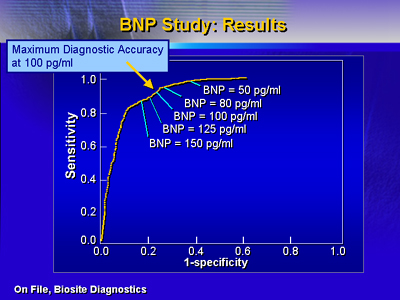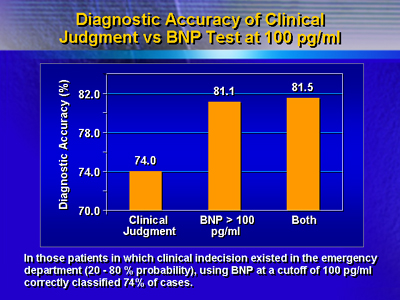| In
this large study, B-type natriuretic peptide was useful as a predictor
of congestive heart failure in patients presenting to the emergency
department with dyspnea. Measurement of this neurohormone adds predictive
power to traditional evaluation. In addition, a single measurement
reduced clinical indecision by 74%.
Recent surveys have suggested the development of a chronic disease
epidemic of heart failure in recent years. Yet diagnostic procedures
for congestive heart failure have remained unchanged for decades.
A cardiac neurohormone, B-type natriuretic peptide, is specifically
secreted from cardiac ventricles. This occurs in response to pressure
overload, ventricular volume expansion, and increased wall tension.
Multiple reports have found a correlation between elevated blood
levels of B-type natriuretic peptide and congestive heart failure.
In 2000, the U.S. Food and Drug Administration approved use of
B-type natriuretic peptide as a diagnostic aid. However, ACC/AHA
guidelines for 2001 state that the role of this neurohormone in
patients with congestive heart failure "remains to be fully
clarified."
The Breathing Not Properly (BNP) Multinational study included 1,586
patients who presented to the emergency department with dyspnea.
Investigators used a 15 minute blood test to evaluate blood levels
of B-natriuretic peptide.
They conducted the blood test using a device about the size of
a desktop calculator (Triage BNP Test, Biosite, Inc.). This was
the first prospective efficacy study for this rapid B-natriuretic
peptide test in emergency department evaluation of dyspnea.

B-natriuretic peptides, at a cutoff of 100 pg/mL, had a sensitivity
of 90%, specificity of 74%, and accuracy of 81.1% for differentiating
congestive heart failure from other dyspnea causes.
The primary endpoint of this study was diagnostic accuracy vs.
clinical evaluation. Results showed that B-natriuretic peptide measurements
were more accurate than clinical evaluation (81% vs. 74%, P <
0.0001).

By multivariate analysis, investigators found the B-natriuretic
peptide measurement added significant predictive power to history,
physical examination, chest X-ray and other traditional components
of evaluation.
Researchers used a Bayesian analysis to determine the incremental
effect of a single B-natriuretic peptide test when clinicians are
unsure of the diagnosis. A single B-natriuretic peptide evaluation
reduced clinical indecision by 74%.
B-natriuretic peptide levels reflected New York Heart Association
functional class in subjects with heart failure.
Based on these results, heart failure guidelines should incorporate
measurement of B-natriuretic peptide for the clinical diagnosis
of heart failure.
|